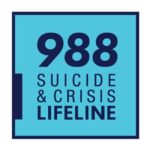DEPRESSION/SUICIDE

988 - The Suicide and Crisis Lifeline in the United States
The 988 Suicide & Crisis Lifeline (formerly known as the National Suicide Prevention Lifeline) is a network of more than 200 state and local call centers funded by the U.S. Department of Health and Human Services. 988 Contact Center services include rapid 24/7 access to trained crisis contact center staff who can help people experiencing suicidal, substance use and other mental health crises, provide referrals to resources, and perform warm transfers to mobile crisis services or emergency services as needed/desired. Studies have shown that after speaking with a trained crisis counselor, most people served by the Lifeline are significantly more likely to feel less depressed, less suicidal, less overwhelmed and more hopeful.

American Association of Suicidology
Mental health, non-suicidal self-harm, and suicide themes on social media continue to be an issue both youth and adults face on a daily basis. Experts recognize that youth engagement with social media includes positive and negative aspects and our goal is to help maximize the benefits while reducing any potential harm. Parents need to have tools for these conversations.

American Foundation for Suicide Prevention
As a parent, you can approach suicide prevention in the same way you do other safety or health issues for your children. By educating yourself, you can learn what puts kids at greatest risk for suicide – and what protects them most strongly.

Child Mind Institute
If you think your child might be feeling suicidal, talk with them about it. Sometimes people are afraid that if they bring it up, it will make the child more likely to attempt suicide, but that’s not true. Showing your child that they have someone safe to talk to makes them feel understood.

World Health Organization
Communities can play a critical role in suicide prevention. They can provide social support to vulnerable individuals and engage in follow-up care, fight stigma and support those bereaved by suicide. They can help give individuals a sense of belonging and a feeling of connectedness by being part of a community. Lastly, communities can also implement specific suicide prevention strategies relevant to their situation.

Today
How parents address suicide with their children varies by age. The American Academy of Pediatrics and the American Psychiatric Association recommend that parents do not talk about tragedies until children are 8 years old. Parents shouldn’t avoid this conversation just because it is tough. It is incredibly important because of the stigma around mental health; it is a reason people give for not getting help.

